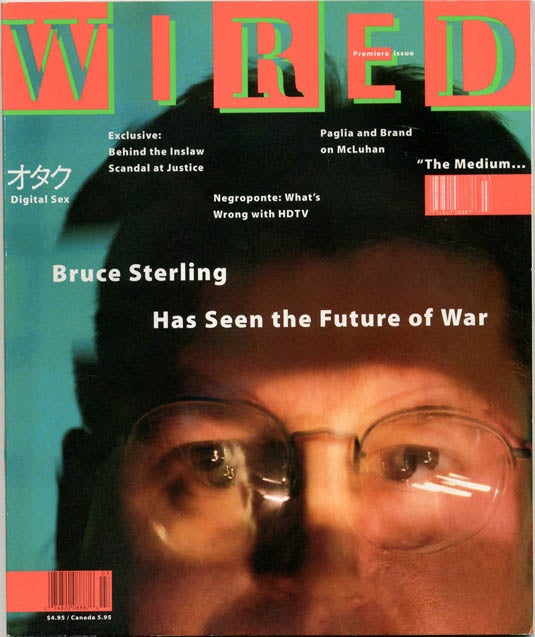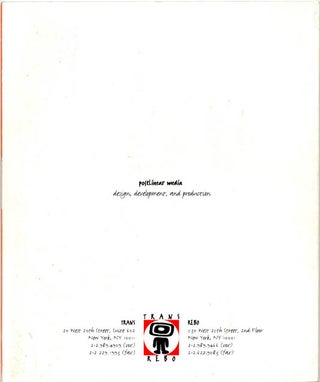188.
WIRED 1.1 - Premiere Issue (SF: March 1993).
Ed. Louis Rossetto. 4to. Wrps., 112pp. Illustrated.
The inaugural issue, announcing: "There are a lot of magazines about technology. Wired is not one of them. Wired is about the most powerful people on the planet today - the Digital Generation. These are the people who not only foresaw how the merger of computers, telecommunications and the media is transforming life at the cusp of the new millennium, they are making it happen."
Rossetto's editorial statement is overlaid on an orange Day-Glo ground printing quotations from Marshall McLuhan, an explicit hommage to the philosopher who predicted the World Wide Web almost 30 years before it was invented, and whose books incorporated the imaginative use of typography Wired sought to emulate via digital technology.
Other contents of this launch issue include Stewart Brand's interview with Camille Paglia (on Marshall McLuhan); John Browning ("Libraries Without Walls For Books Without Pages"); Gerard van der Leun (former editor of The Organ, item #53) on online sex ("sex is a virus that infects new technology first"); Nicholas Negroponte (of the MIT Media Lab and Wired magazine's first investor) on HDTV; tech reviews; ads.; more.
The magazine's founding executive editor, Kevin Kelly, had been an editor of later versions of the Whole Earth Catalog, and six of the contributors to this first issue had previously written for its descendant, Whole Earth Review, notably Bruce Sterling (featured on the front cover) and Stewart Brand.
Together with Brand, Kelly had also helped found the Whole Earth 'Lectronic Link (WELL), an influential online community through which John Perry Barlow, John Gilmore and Mitch Kapor, founders of the Electronic Frontier Foundation, first met (it was also a major online meeting place for fans of the Grateful Dead).
Although appearing countercultural, with roots in the communal movement's utopian ambitions, Wired also served as a meeting point for representatives of the deregulationist New Right, such as Newt Gingrich, who later appeared on its cover, and other proponents of the New Economy, reflecting Rossetto's own techno-libertarianism. With one foot in both camps, Wired succeeded in conferring cool legitimacy upon the business networks it cultivated, while simultaneously nurturing the techno-utopian social visions of the counterculture that helped give rise to it.
Slight rubbing to back cover; spine uncreased. Near Fine. The scarce debut of a magazine that considered itself to be "the Rolling Stone of technology"
 Back to top
Back to top



